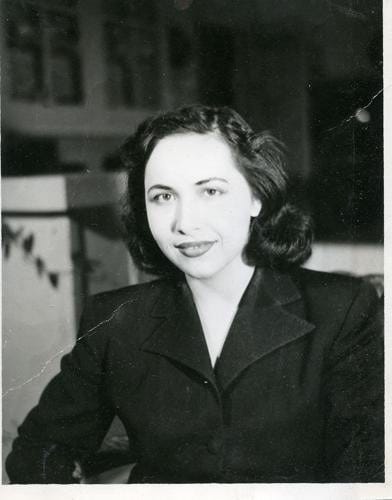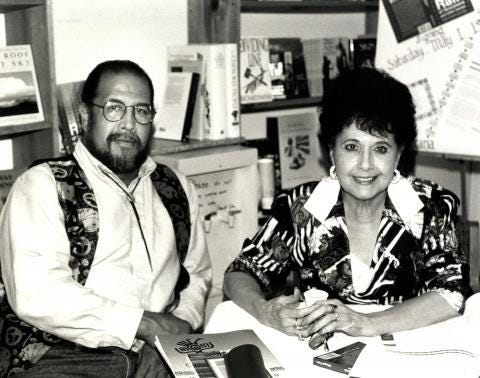Happy Wednesday, readers 👋🏻
I hope everyone had a restful and relaxing Memorial Day Weekend! I went to the beach with some gal pals! We had some giggles, beach fries, and saw many dolphins 🐬
Today, we are learning about an iconic feminist Chicana playwright, poet, and author. Meet Estela Portillo-Trambley!

Estela Portillo-Trambley was born in 1926 in El Paso, Texas. Quick aside, I lived in Texas for a year, and I was *obsessed* with the food. Where are the good beans and queso in DC? Why can’t I find a sour cream enchilada within 100 miles of me? Okay, back to the main event!
Her parents worked as a mechanic (dad) and a piano teacher (mom). Estela notably spent a lot of time with her maternal grandparents, who immigrated from Mexico. Her grandpa, Julian Fierro, ran a grocery store called Amigo de la Pobres (Friend of the Poor) in the El Segundo Barrio, which was known as the “other Ellis Island” because it was the main port of entry from Mexico to the United States. Several sources stated that her exposure to poverty as well as cultural differences later inspired Estela in her writing.
Estela formed a love of literature and reading as a child. A gal after my own heart 💖She graduated from El Paso High School and married Robert Trambley, a white salesman. The internet can’t decide whether she was married at 17 or 20, so let’s say she was married relatively young by today’s standards. Although Estela and Robert had six kids (Did they have minivans in the 1950s?), she attended the University of Texas at El Paso, where she graduated with both a Bachelor of Arts (1956) and a Master’s in English (1977).
After graduating with her bachelor’s, Estela taught English in El Paso public schools. She worked her way up to become Chair of the English Department at El Paso Technical High School, where she remained for six years. After teaching for several years, Estela decided to take up writing.
She realized “[I] had to do something besides raise children and teach school.”
It is also around this time that her one-year-old son tragically died, and her grief fueled her writing process. In addition to fostering her love of writing, Estela also became involved in theatre and playwriting. From 1970-1975, she was the resident dramatist at El Paso Community College. I believe my family would say I am the resident dramatist of our household 😉 Estela was also a founding member of the Los Pobres Bilingual Theater, the first bilingual theatre in El Paso.
Estela’s plays were known for their feminist plot points and for exploring Chicana identities. She often said her writing focused on “angry women” who challenged patriarchal tendencies.
“Look at all the women in my stories… they’re very independent; they create their own universes; they are very unorthodox. They aren’t held down by rules and regulations.”
Estela wrote several plays, a collection of short stories, and one novel, including:
🎭 The Day of the Swallows — A story of Josepha, a well-respected woman in the Chicano community who secretly begins a lesbian relationship with a young woman she saves from a brothel-type establishment. It is a modern tragedy with feminist and queer themes. In 1972, it won the Quinto Sol Award.
🎭 Puente Negro (Black Bridge) — A play focused on immigration.
🎭 Sor Juana and Other Plays — These plays explore different facets of the human experience: the dilemma of the mojado, human vulnerabilities in the search for a way to overcome death, the alienation of the Hispanic family amidst economic hardships and personal crises, and the existential conflicts of Mexico's most celebrated feminist thinker, Sor Juana Ines de la Cruz (text directly from Google Books).
🎭 Blacklight — A play about cultural identity struggles. Placed second in the New York Shakespeare Festival Hispanic playwright competition.
📚 Rain of Scorpions and Other Writings — A collection of narratives that delve into the lives and experiences of Chicano and Mexican-American characters, predominantly women, as they navigate the complexities of identity, culture, and societal expectations in the American Southwest. (text directly from this book summary). This work won Estela the Premio Quinto Sol Award in 1975, which was the first time it had been awarded to a woman.
📚 Trini — Trini is Estela’s only novel. It follows the captivating story of Trini, a young woman’s journey from Mexico to the United States and into womanhood.

As if cranking out award-winning 🏆 plays wasn’t enough, Estela had a radio political talk show on KIZZ in El Paso called “Stella Says” AND a television show about art and culture on KROD-TV. She was inducted into the El Paso Women’s Hall of Fame. Lastly, in 1995, she was the Presidential Chair in Creative Writing at the University of California, Davis.
If you’re ever in El Paso, check out the historical marker dedicated to Estela Portillo-Trambley in the Chamizal National Memorial’s Spanish Garden.
Alrighty, that’s all for this week. Hope you learned something!
Citations
https://www.jstor.org/stable/25745334
https://www.womenintexashistory.org/audio/trambley/
https://www.elpasotimes.com/story/news/2018/02/23/historical-marker-honors-chicana-playwright-el-paso-native-estela-portillo-trambley-puente-negro/367226002/
https://www.ebsco.com/research-starters/history/estela-portillo-trambley
https://www.elpasoinc.com/lifestyle/local_features/women-s-history-who-was-estela-portillo-trambley/article_36e682ca-1ff5-11e8-9ae9-b7448de1ce43.html
https://thebillbeaverproject.com/2018/09/29/estela-portillo-trambley/



Muy bueno Miss Kate! Clearly a woman who brought home the bacon and fried it up in a pan :)